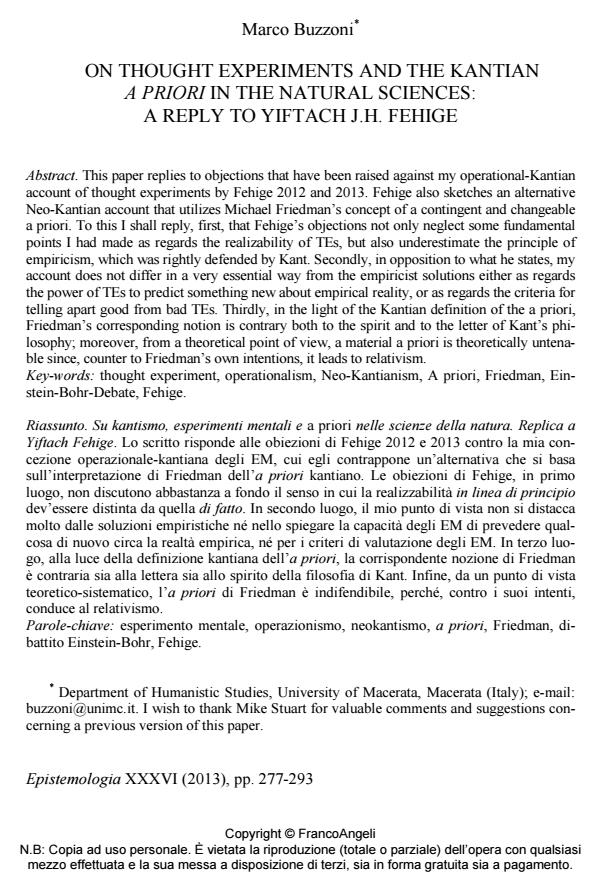On thought experiments and the Kantian a priori in the natural sciences: a reply to Yiftach J.H. Fehige
Titolo Rivista EPISTEMOLOGIA
Autori/Curatori Marco Buzzoni
Anno di pubblicazione 2014 Fascicolo 2013/2
Lingua Inglese Numero pagine 17 P. 277-293 Dimensione file 637 KB
DOI 10.3280/EPIS2013-002006
Il DOI è il codice a barre della proprietà intellettuale: per saperne di più
clicca qui
Qui sotto puoi vedere in anteprima la prima pagina di questo articolo.
Se questo articolo ti interessa, lo puoi acquistare (e scaricare in formato pdf) seguendo le facili indicazioni per acquistare il download credit. Acquista Download Credits per scaricare questo Articolo in formato PDF

FrancoAngeli è membro della Publishers International Linking Association, Inc (PILA), associazione indipendente e non profit per facilitare (attraverso i servizi tecnologici implementati da CrossRef.org) l’accesso degli studiosi ai contenuti digitali nelle pubblicazioni professionali e scientifiche.
This paper replies to objections that have been raised against my operational-Kantian account of thought experiments by Fehige 2012 and 2013. Fehige also sketches an alternative Neo-Kantian account that utilizes Michael Friedman’s concept of a contingent and changeable a priori. To this I shall reply, first, that Fehige’s objections not only neglect some fundamental points I had made as regards the realizability of TEs, but also underestimate the principle of empiricism, which was rightly defended by Kant. Secondly, in opposition to what he states, my account does not differ in a very essential way from the empiricist solutions either as regards the power of TEs to predict something new about empirical reality, or as regards the criteria for telling apart good from bad TEs. Thirdly, in the light of the Kantian definition of the a priori, Friedman’s corresponding notion is contrary both to the spirit and to the letter of Kant’s philosophy; moreover, from a theoretical point of view, a material a priori is theoretically untenable since, counter to Friedman’s own intentions, it leads to relativism.
Lo scritto risponde alle obiezioni di Fehige 2012 e 2013 contro la mia concezione operazionale-kantiana degli EM, cui egli contrappone un’alternativa che si basa sull’interpretazione di Friedman dell’a priori kantiano. Le obiezioni di Fehige, in primo luogo, non discutono abbastanza a fondo il senso in cui la realizzabilità in linea di principio dev’essere distinta da quella di fatto. In secondo luogo, il mio punto di vista non si distacca molto dalle soluzioni empiristiche né nello spiegare la capacità degli EM di prevedere qualcosa di nuovo circa la realtà empirica, né per i criteri di valutazione degli EM. In terzo luogo, alla luce della definizione kantiana dell’a priori, la corrispondente nozione di Friedman è contraria sia alla lettera sia allo spirito della filosofia di Kant. Infine, da un punto di vista teoretico-sistematico, l’a priori di Friedman è indifendibile, perché, contro i suoi intenti, conduce al relativismo.
Parole chiave:Esperimento mentale, operazionismo, neokantismo, a priori, Friedman, dibattito Einstein-Bohr, Fehige.
- Exploring How Students Construct Collaborative Thought Experiments During Physics Problem-Solving Activities Hartono Bancong, Jinwoong Song, in Science & Education /2020 pp.617
DOI: 10.1007/s11191-020-00129-3 - Thought Experiments Nenad Miscevic, pp.31 (ISBN:978-3-030-81081-8)
- From naturalized to actualized thought experiments: cognitive neuroscience, the theory gap, and the method of cases Ryan M. Nefdt, Giosuè Baggio, in Philosophical Psychology /2025 pp.1
DOI: 10.1080/09515089.2025.2608211
Marco Buzzoni, On thought experiments and the Kantian a priori in the natural sciences: a reply to Yiftach J.H. Fehige in "EPISTEMOLOGIA" 2/2013, pp 277-293, DOI: 10.3280/EPIS2013-002006